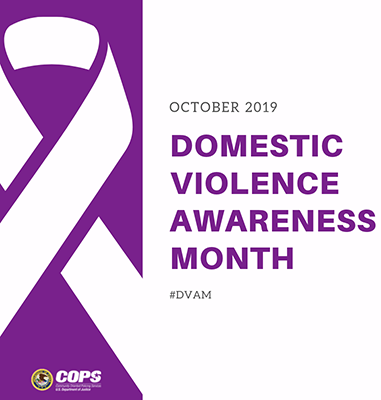Contact Us
To provide feedback on the Community Policing Dispatch, e-mail the editorial board at CPDispatch@usdoj.gov.
To obtain details on COPS Office programs, publications, and resources, contact the COPS Office Response Center at 800-421-6770 or AskCopsRC@usdoj.gov

U.S. Department of Justice
Office of Community Oriented Policing Services
Washington, DC 20530
In honor of Domestic Violence Awareness Month, the COPS Office would like to highlight some technical assistance available to law enforcement agencies.
 The Collaborative Reform Initiative for Technical Assistance Center (CRI-TAC) provides critical and tailored technical assistance resources to state, local, territorial, and tribal law enforcement agencies on a wide variety of topics, including domestic violence. At your agency’s request, the CRI-TAC is able to deliver personalized technical assistance by leading subject matter experts, such as the Office on Violence Against Women/National Sheriffs’ Association two-day training, “Response to and Investigation of Domestic Violence, Dating Violence, and Stalking.” This training is taught by a multidisciplinary team consisting of a law enforcement officer, a prosecutor, and a victim advocate. It covers six main components: Lethality, Liability, Dynamics, Investigating, Interviewing, and Federal Laws pertaining to domestic violence, dating violence, and stalking cases. Other examples of CRI-TAC’s “by the field, for the field” assistance include trainings on policy development, strategic planning, and peer-to-peer exchanges.
The Collaborative Reform Initiative for Technical Assistance Center (CRI-TAC) provides critical and tailored technical assistance resources to state, local, territorial, and tribal law enforcement agencies on a wide variety of topics, including domestic violence. At your agency’s request, the CRI-TAC is able to deliver personalized technical assistance by leading subject matter experts, such as the Office on Violence Against Women/National Sheriffs’ Association two-day training, “Response to and Investigation of Domestic Violence, Dating Violence, and Stalking.” This training is taught by a multidisciplinary team consisting of a law enforcement officer, a prosecutor, and a victim advocate. It covers six main components: Lethality, Liability, Dynamics, Investigating, Interviewing, and Federal Laws pertaining to domestic violence, dating violence, and stalking cases. Other examples of CRI-TAC’s “by the field, for the field” assistance include trainings on policy development, strategic planning, and peer-to-peer exchanges.
Accessing these or other CRI-TAC programs is easy. All it takes is a request from your agency’s law enforcement executive or representative with the following information:
- Name of the agency
- Number of sworn personnel
- Size of population served
- Topic and service requested
- Contact information
To learn more about CRI-TAC and request technical assistance, please visit the COPS Office CRI-TAC website.
Other resources available from the COPS Office include the following:
- “A Different Response to Intimate Partner Violence” (article). In this article, High Point (North Carolina) Police Chief Marty Sumner describes how his agency is tackling intimate partner violence using the focused deterrence approach.
- “Domestic Violence Focused Deterrence” (podcast). In this podcast, Captain Ellenberger of the High Point major crime deterrent and prevention section discusses the High Point Offender-Focused Domestic Violence Initiative Strategy.
- Identifying and Preventing Gender Bias in Law Enforcement Response to Sexual Assault and Domestic Violence: A roundtable discussion (report). Women and LGBT individuals are disproportionately victimized by sexual assault and domestic violence, and underenforcement of such offenses can reflect bias on the part of law enforcement. This publication summarizes the August 4, 2015 roundtable discussion of the guidance provided in a draft version of the U.S. Department of Justice's Identifying and Preventing Gender Bias in Law Enforcement Response to Sexual Assault and Domestic Violence. This summary of the roundtable reflects the opinions and recommendations of the law enforcement officials, victim advocates, and subject matter experts who attended.
- “Law Enforcement Strategies for Addressing Domestic Violence” (podcast). In this podcast, Rachel Braunstein, an attorney at Her Justice, discusses domestic violence and provides helpful tips, strategies, and tools for law enforcement.
- “The Link Between Animal Cruelty and Domestic Violence” (podcast). In this podcast, Dr. Randall Lockwood, senior vice president for Forensic Sciences and Anti-Cruelty Projects for the American Society for the Prevention of Cruelty to Animals, discusses the link between animal cruelty and domestic violence.
- Police-Community Partnerships to Address Domestic Violence (report). Through the philosophy and practice of community policing, some law enforcement agencies are seeking to improve their effectiveness at dealing with domestic violence by forming police-community partnerships to enhance their response options. The Police Executive Research Forum (PERF), with funding from the COPS Office, explored the nature, function, and impact of such police-community partnerships. The research shows that partnerships between police and community partners have made improvements in the way that agencies communicate with each other and in how they focus their
 energies on improving the safety of victims of domestic violence. This publication highlights such initiatives around the country that can be replicated to better address domestic violence.
energies on improving the safety of victims of domestic violence. This publication highlights such initiatives around the country that can be replicated to better address domestic violence. - Problem Oriented Policing Guide: Domestic Violence (report). Domestic disputes are some of the most common calls for police service. Many domestic disputes do not involve violence; this guide discusses those that do, as well as the measures that can be used to reduce them. In the United States, domestic violence accounts for about 20 percent of the nonfatal violent crime women experience and 3 percent of the nonfatal violent crime men experience. This is an essential tool for law enforcement to help analyze and respond to their local problem.
- “Transforming an Agency to Respond to Domestic Violence” (article). This article covers the importance of organizationally changing an agency to focus on domestic violence.
- “Using a Focused Deterrence Strategy with Intimate Partner Violence” (article). This article is a follow-up to a previous article regarding the offender focused domestic violence initiative.
Subscribe to Email Updates
To sign up for monthly updates or to access your subscriber preferences, please enter your email address in the Subscribe box.






